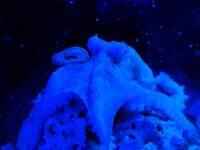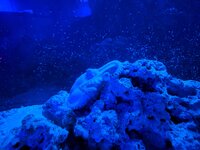LOL. I see you noticed I left senescence off the list of possible problems...
I'll try to pick up some different foods tomorrow. We feed the GPO at the National Aquarium smelt among other things. Do you think this would be suitable for this type of octopus? The local grocery store has smelt available. Or should I spring for something like tuna? I can look into fiddlers too. Unfortunately I don't have any local fish stores near me. I'll see if Petco has any fiddlers (I don't recall ever seeing any on the occasions I've been there though).
I know this might seem like denial, but I can't help but think it's way too early for this to be the end. Is size any indicator of age? Davy appears to be a lot smaller than ET. Does O. hummelincki only usually live for a year? I see you've had ET since May according to your thread. Do you expect it'll be the end for him soon too?
I'll try to pick up some different foods tomorrow. We feed the GPO at the National Aquarium smelt among other things. Do you think this would be suitable for this type of octopus? The local grocery store has smelt available. Or should I spring for something like tuna? I can look into fiddlers too. Unfortunately I don't have any local fish stores near me. I'll see if Petco has any fiddlers (I don't recall ever seeing any on the occasions I've been there though).
I know this might seem like denial, but I can't help but think it's way too early for this to be the end. Is size any indicator of age? Davy appears to be a lot smaller than ET. Does O. hummelincki only usually live for a year? I see you've had ET since May according to your thread. Do you expect it'll be the end for him soon too?



